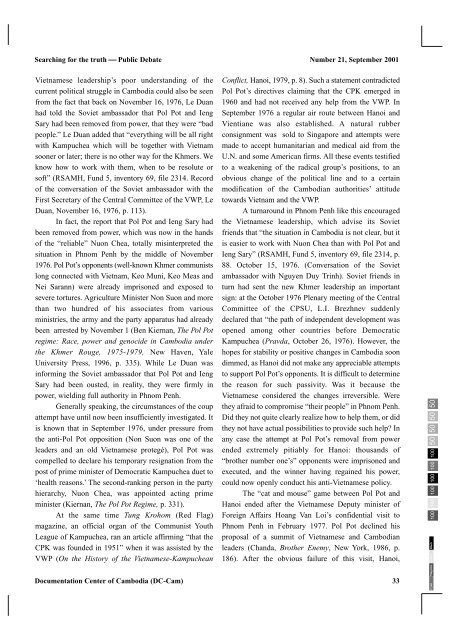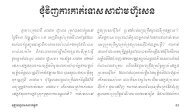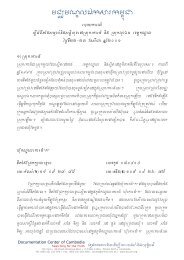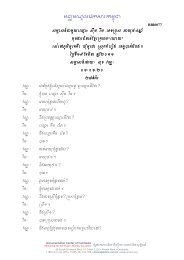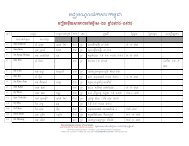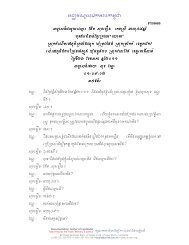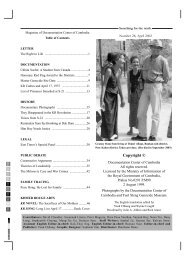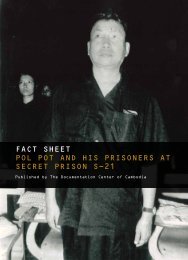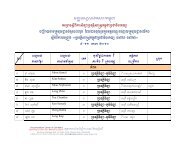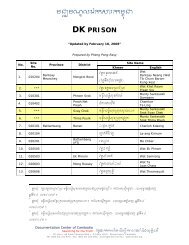Searching for the truth Issues 21 - Documentation Center of Cambodia
Searching for the truth Issues 21 - Documentation Center of Cambodia
Searching for the truth Issues 21 - Documentation Center of Cambodia
Create successful ePaper yourself
Turn your PDF publications into a flip-book with our unique Google optimized e-Paper software.
<strong>Searching</strong> <strong>for</strong> <strong>the</strong> <strong>truth</strong> ⎯ Public Debate<br />
Vietnamese leadership’s poor understanding <strong>of</strong> <strong>the</strong><br />
current political struggle in <strong>Cambodia</strong> could also be seen<br />
from <strong>the</strong> fact that back on November 16, 1976, Le Duan<br />
had told <strong>the</strong> Soviet ambassador that Pol Pot and Ieng<br />
Sary had been removed from power, that <strong>the</strong>y were “bad<br />
people.” Le Duan added that “everything will be all right<br />
with Kampuchea which will be toge<strong>the</strong>r with Vietnam<br />
sooner or later; <strong>the</strong>re is no o<strong>the</strong>r way <strong>for</strong> <strong>the</strong> Khmers. We<br />
know how to work with <strong>the</strong>m, when to be resolute or<br />
s<strong>of</strong>t” (RSAMH, Fund 5, inventory 69, file 2314. Record<br />
<strong>of</strong> <strong>the</strong> conversation <strong>of</strong> <strong>the</strong> Soviet ambassador with <strong>the</strong><br />
First Secretary <strong>of</strong> <strong>the</strong> Central Committee <strong>of</strong> <strong>the</strong> VWP, Le<br />
Duan, November 16, 1976, p. 113).<br />
In fact, <strong>the</strong> report that Pol Pot and Ieng Sary had<br />
been removed from power, which was now in <strong>the</strong> hands<br />
<strong>of</strong> <strong>the</strong> “reliable” Nuon Chea, totally misinterpreted <strong>the</strong><br />
situation in Phnom Penh by <strong>the</strong> middle <strong>of</strong> November<br />
1976. Pol Pot’s opponents (well-known Khmer communists<br />
long connected with Vietnam, Keo Muni, Keo Meas and<br />
Nei Sarann) were already imprisoned and exposed to<br />
severe tortures. Agriculture Minister Non Suon and more<br />
than two hundred <strong>of</strong> his associates from various<br />
ministries, <strong>the</strong> army and <strong>the</strong> party apparatus had already<br />
been arrested by November 1 (Ben Kiernan, The Pol Pot<br />
regime: Race, power and genocide in <strong>Cambodia</strong> under<br />
<strong>the</strong> Khmer Rouge, 1975-1979, New Haven, Yale<br />
University Press, 1996, p. 335). While Le Duan was<br />
in<strong>for</strong>ming <strong>the</strong> Soviet ambassador that Pol Pot and Ieng<br />
Sary had been ousted, in reality, <strong>the</strong>y were firmly in<br />
power, wielding full authority in Phnom Penh.<br />
Generally speaking, <strong>the</strong> circumstances <strong>of</strong> <strong>the</strong> coup<br />
attempt have until now been insufficiently investigated. It<br />
is known that in September 1976, under pressure from<br />
<strong>the</strong> anti-Pol Pot opposition (Non Suon was one <strong>of</strong> <strong>the</strong><br />
leaders and an old Vietnamese protegé), Pol Pot was<br />
compelled to declare his temporary resignation from <strong>the</strong><br />
post <strong>of</strong> prime minister <strong>of</strong> Democratic Kampuchea duet to<br />
‘health reasons.’ The second-ranking person in <strong>the</strong> party<br />
hierarchy, Nuon Chea, was appointed acting prime<br />
minister (Kiernan, The Pol Pot Regime, p. 331).<br />
At <strong>the</strong> same time Tung Krohom (Red Flag)<br />
magazine, an <strong>of</strong>ficial organ <strong>of</strong> <strong>the</strong> Communist Youth<br />
League <strong>of</strong> Kampuchea, ran an article affirming “that <strong>the</strong><br />
CPK was founded in 1951” when it was assisted by <strong>the</strong><br />
VWP (On <strong>the</strong> History <strong>of</strong> <strong>the</strong> Vietnamese-Kampuchean<br />
<strong>Documentation</strong> <strong>Center</strong> <strong>of</strong> <strong>Cambodia</strong> (DC-Cam)<br />
Number <strong>21</strong>, September 2001<br />
Conflict, Hanoi, 1979, p. 8). Such a statement contradicted<br />
Pol Pot’s directives claiming that <strong>the</strong> CPK emerged in<br />
1960 and had not received any help from <strong>the</strong> VWP. In<br />
September 1976 a regular air route between Hanoi and<br />
Vientiane was also established. A natural rubber<br />
consignment was sold to Singapore and attempts were<br />
made to accept humanitarian and medical aid from <strong>the</strong><br />
U.N. and some American firms. All <strong>the</strong>se events testified<br />
to a weakening <strong>of</strong> <strong>the</strong> radical group’s positions, to an<br />
obvious change <strong>of</strong> <strong>the</strong> political line and to a certain<br />
modification <strong>of</strong> <strong>the</strong> <strong>Cambodia</strong>n authorities’ attitude<br />
towards Vietnam and <strong>the</strong> VWP.<br />
A turnaround in Phnom Penh like this encouraged<br />
<strong>the</strong> Vietnamese leadership, which advise its Soviet<br />
friends that “<strong>the</strong> situation in <strong>Cambodia</strong> is not clear, but it<br />
is easier to work with Nuon Chea than with Pol Pot and<br />
Ieng Sary” (RSAMH, Fund 5, inventory 69, file 2314, p.<br />
88. October 15, 1976. (Conversation <strong>of</strong> <strong>the</strong> Soviet<br />
ambassador with Nguyen Duy Trinh). Soviet friends in<br />
turn had sent <strong>the</strong> new Khmer leadership an important<br />
sign: at <strong>the</strong> October 1976 Plenary meeting <strong>of</strong> <strong>the</strong> Central<br />
Committee <strong>of</strong> <strong>the</strong> CPSU, L.I. Brezhnev suddenly<br />
declared that “<strong>the</strong> path <strong>of</strong> independent development was<br />
opened among o<strong>the</strong>r countries be<strong>for</strong>e Democratic<br />
Kampuchea (Pravda, October 26, 1976). However, <strong>the</strong><br />
hopes <strong>for</strong> stability or positive changes in <strong>Cambodia</strong> soon<br />
dimmed, as Hanoi did not make any appreciable attempts<br />
to support Pol Pot’s opponents. It is difficult to determine<br />
<strong>the</strong> reason <strong>for</strong> such passivity. Was it because <strong>the</strong><br />
Vietnamese considered <strong>the</strong> changes irreversible. Were<br />
<strong>the</strong>y afraid to compromise “<strong>the</strong>ir people” in Phnom Penh.<br />
Did <strong>the</strong>y not quite clearly realize how to help <strong>the</strong>m, or did<br />
<strong>the</strong>y not have actual possibilities to provide such help? In<br />
any case <strong>the</strong> attempt at Pol Pot’s removal from power<br />
ended extremely pitiably <strong>for</strong> Hanoi: thousands <strong>of</strong><br />
“bro<strong>the</strong>r number one’s” opponents were imprisoned and<br />
executed, and <strong>the</strong> winner having regained his power,<br />
could now openly conduct his anti-Vietnamese policy.<br />
The “cat and mouse” game between Pol Pot and<br />
Hanoi ended after <strong>the</strong> Vietnamese Deputy minister <strong>of</strong><br />
Foreign Affairs Hoang Van Loi’s confidential visit to<br />
Phnom Penh in February 1977. Pol Pot declined his<br />
proposal <strong>of</strong> a summit <strong>of</strong> Vietnamese and <strong>Cambodia</strong>n<br />
leaders (Chanda, Bro<strong>the</strong>r Enemy, New York, 1986, p.<br />
186). After <strong>the</strong> obvious failure <strong>of</strong> this visit, Hanoi,<br />
33<br />
100 100 100 100 100 100 50 50 50 50<br />
Black<br />
Yellow<br />
Magenta<br />
Cyan


